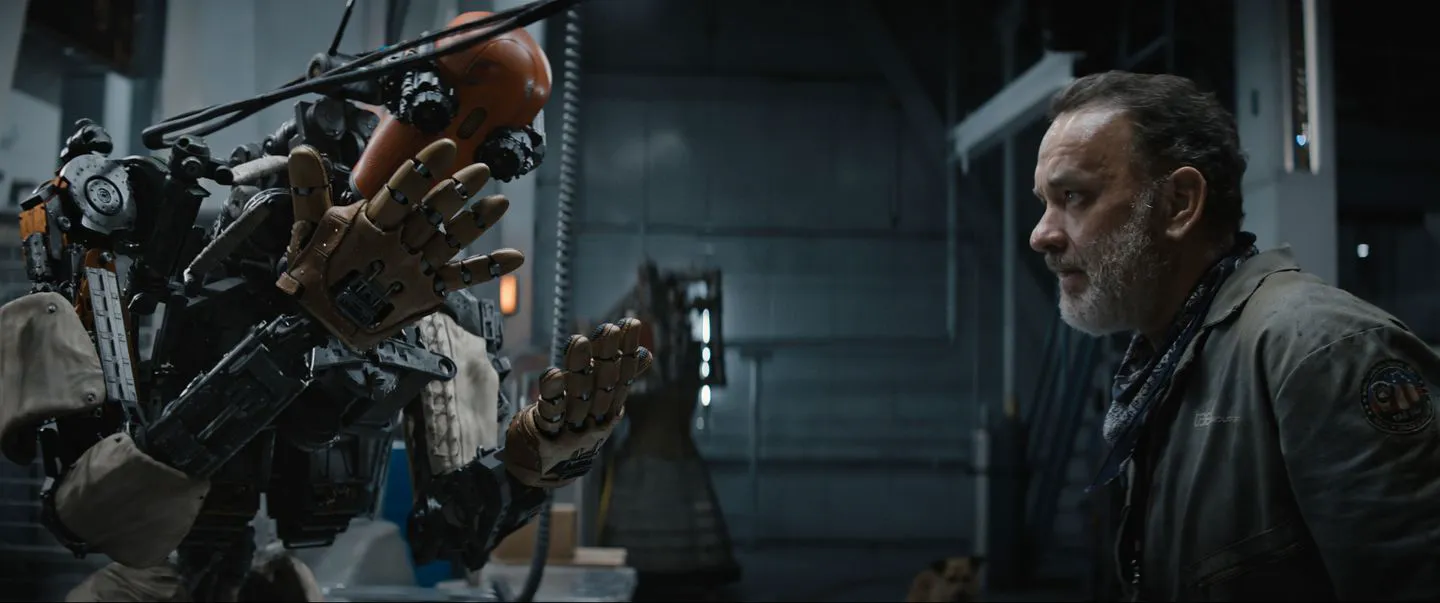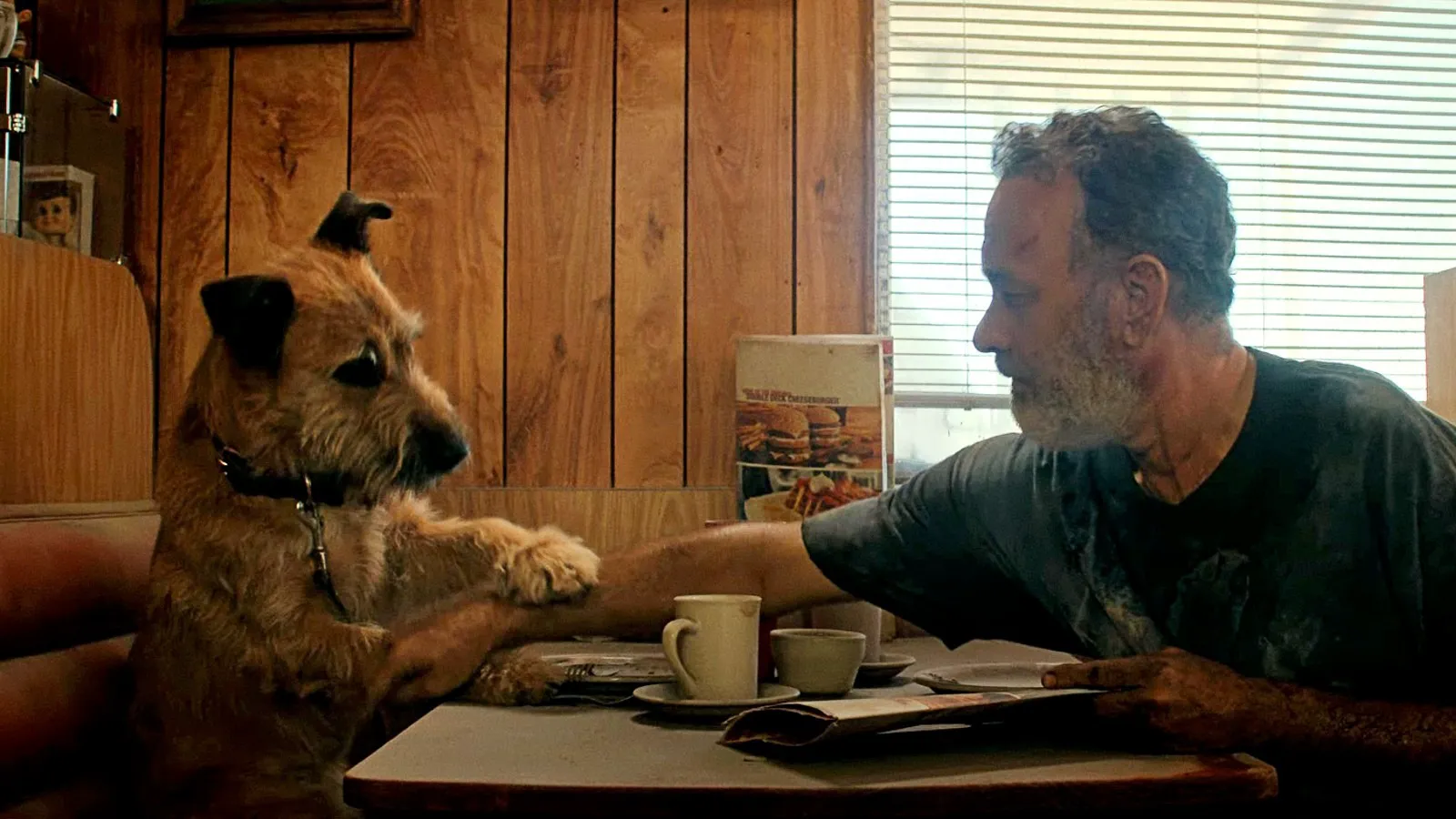Finch: A Post-Apocalyptic Road Trip with Heart
In a desolate, sun-scorched Earth, Finch (played by Tom Hanks), a bearded and gaunt engineer, might just be the last man standing. Ironically, this survivor is a brilliant robotics expert, though his inventions are unlikely to save civilization. Instead, they serve a more personal purpose: to help him survive the harsh environment. While a merciless sun obliterates anyone caught in its rays, Finch thrives in his home laboratory, accompanied by his beloved dog and a collection of quirky robot minions.

Tom Hanks as Finch in the movie “Finch”
Lately, Finch has been dedicated to his magnum opus: a sentient, learning robot designed to take his place after he, old and ailing, is gone. This creation is solely for the sake of his dog, the only being on the planet that truly matters to him. The android must learn to drive, scavenge for food, and, most importantly, play with his furry companion.
A Robot with a Mind of Its Own
However, there’s a catch. The robot assistant (voiced with brilliant eccentricity by Caleb Landry Jones) speaks with a peculiar accent and behaves…unpredictably. Despite Finch’s intelligence, his creation initially resembles a clumsy character from a silent slapstick comedy more than a responsible dog owner. He stumbles down stairs like Chaplin, gets into Buster Keaton-esque car accidents, and bombards Finch with a barrage of childlike questions. Jeff, as the android names himself, is more than just metal. In a world seemingly devoid of new life, he becomes Finch’s unlikely heir, a naive toddler incapable of caring for himself, let alone a dog.
Miguel Sapochnik’s Exploration of Humanity
Miguel Sapochnik, surprisingly, directed his first and, until recently, only film 11 years ago. From the cynical and bleak aesthetic of “Repo Men,” he transitioned into serial television, contributing to shows like “Game of Thrones,” “True Detective,” and “House.” In 2021, despite the failure of his debut, he returned to the genre where he began. This artistic persistence is understandable when considering his limited filmography. Whether in his unsuccessful debut, “Finch,” or episodes of TV science fiction (“Under the Dome”), Sapochnik explores the humanity of his characters under the constraints of new morals and a new era. The futuristic setting is merely a variable that allows him to calculate the enduring values that define us as human beings.

Tom Hanks as Finch in the movie “Finch”
Familiar Themes, Fresh Execution
While “Finch” communicates with the audience through familiar tropes, it’s filmed with such elegant ease that its conventionality becomes a feature, not a flaw. “Repo Men” shamelessly borrowed from classic cyberpunk and uncompromising dystopias like Gilliam’s “Brazil,” and Sapochnik’s new film is equally derivative. The lifeless, desolate Earth and car chases are reminiscent of “Mad Max,” the journey of the last man with his beloved pet echoes “A Boy and His Dog,” and the androids dreaming of electric sheep are a nod to Philip K. Dick.

Tom Hanks as Finch in the movie “Finch”
Sapochnik isn’t an auteur in the traditional sense; he’s a craftsman, assembling films from cinematic memories and the ideas of his screenwriters. Criticizing “Finch” for its lack of originality is as foolish as expecting a film with a dog, a robot, and a dying old man to possess the philosophical depth of “Solaris.” However, while the script is straightforward, Sapochnik’s execution is masterful, bringing each page to life. “Finch” is filled with pauses, filled with tender admiration for the characters and their surroundings. A mobile home filled with junk, a glitching android learning about the world, a lonely scientist trying to preserve a memory of the past in the form of his beloved dog – this film possesses a charming road-trip melancholy.
Finding Humanity in a Ruined World
The most valuable moments in “Finch” aren’t the chases (the pursuers are rarely shown, barely adding to the suspense), but the everyday scenes. Here, Sapochnik-the-craftsman is overtaken by Sapochnik-the-cynic: Hanks spits blood on a pristine white suit prepared for a meeting with a lost brother, and the car journeys are soundtracked by Talking Heads’ “Road To Nowhere,” a spirited song of despair about past traumas leading nowhere. The secret to human existence lies not only in sharing love with loved ones, as “Finch” insists throughout its runtime, but also in achieving harmony with oneself and being able to laugh at one’s life. A planet in ruins, past mistakes clouding the eyes and stealing breath, and the only ones who can share your grief are a talking tin can and a slobbering dog. Even on a scorched Earth, one can remain serenely happy – one only needs to carry feelings through years of pain and suffering.